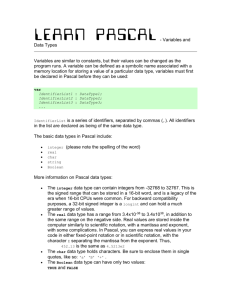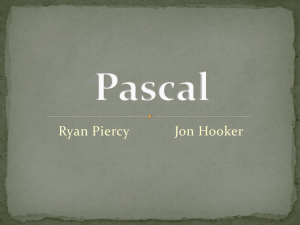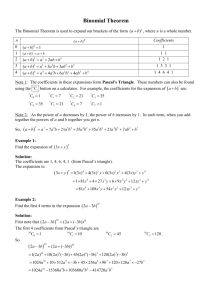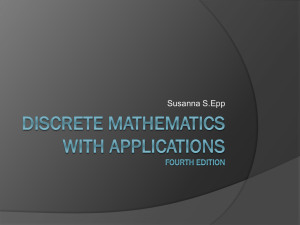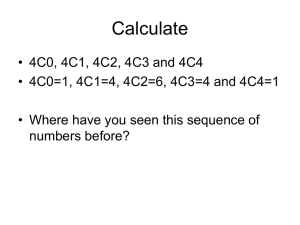File
advertisement
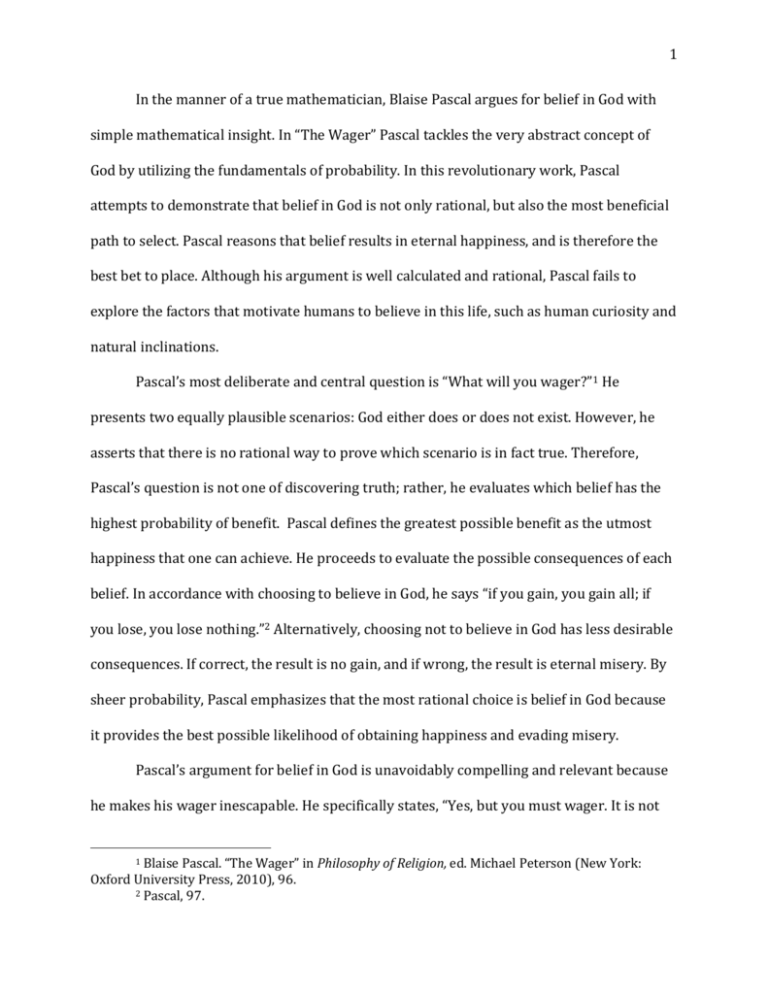
1 In the manner of a true mathematician, Blaise Pascal argues for belief in God with simple mathematical insight. In “The Wager” Pascal tackles the very abstract concept of God by utilizing the fundamentals of probability. In this revolutionary work, Pascal attempts to demonstrate that belief in God is not only rational, but also the most beneficial path to select. Pascal reasons that belief results in eternal happiness, and is therefore the best bet to place. Although his argument is well calculated and rational, Pascal fails to explore the factors that motivate humans to believe in this life, such as human curiosity and natural inclinations. Pascal’s most deliberate and central question is “What will you wager?”1 He presents two equally plausible scenarios: God either does or does not exist. However, he asserts that there is no rational way to prove which scenario is in fact true. Therefore, Pascal’s question is not one of discovering truth; rather, he evaluates which belief has the highest probability of benefit. Pascal defines the greatest possible benefit as the utmost happiness that one can achieve. He proceeds to evaluate the possible consequences of each belief. In accordance with choosing to believe in God, he says “if you gain, you gain all; if you lose, you lose nothing.”2 Alternatively, choosing not to believe in God has less desirable consequences. If correct, the result is no gain, and if wrong, the result is eternal misery. By sheer probability, Pascal emphasizes that the most rational choice is belief in God because it provides the best possible likelihood of obtaining happiness and evading misery. Pascal’s argument for belief in God is unavoidably compelling and relevant because he makes his wager inescapable. He specifically states, “Yes, but you must wager. It is not Blaise Pascal. “The Wager” in Philosophy of Religion, ed. Michael Peterson (New York: Oxford University Press, 2010), 96. 2 Pascal, 97. 1 2 optional.”3 Entrance into Pascal’s conversation is, in his eyes, mandated by existence. As he says, “You are embarked.”4 Pascal’s rationale stands somewhat impervious to criticism because he alters the conventional outlets of arriving at belief. He discredits the idea of using reason to better understand God by identifying God as a distant and “incomprehensible” being.5 He states that it is impossible to rationally confirm or negate the existence of God. If there is no way to use rational thought to understand God, humans seemingly have no other choice but to follow Pascal’s logic of probability to reason whether or not to believe. In this way, Pascal jettisons the orthodoxy of reason and creates new rules to a new game. Although Pascal’s argument is fortified with logic and its own set of rules, his theory fails to consider alternative motivations for belief. Pascal emphasizes the contrast between happiness and misery in the afterlife as a primary incentive for choosing to accept belief in God. However, humans are not solely motivated by the consequences in the afterlife. Other factors, especially human curiosity and natural inclinations motivate us to believe, or not to believe. These factors have implications that more greatly affect our daily lives in the here and now. Human curiosity drives people to better understand the world in which they live. It is a natural impulsion that is engrained in our very beings. It is the fiber that causes us to ask questions, just as Pascal felt compelled to question and explain belief in terms of probability. Pascal insists that because we cannot discover whether or not God exists in finite terms, we should not continue to question and seek the answer. In regard to God, he Pascal, 97. Pascal, 97. 5 Pascal, 96. 3 4 3 states, “We are then incapable of knowing either what He is or if He is. This being so, who will dare to undertake the decision of the question? Not we, who have no affinity to Him.”6 The rational choice may be to abandon the pursuit of knowledge and choose the most beneficial route. However, human curiosity is too difficult to suppress, rendering this abandonment virtually impossible. In “A Will to Believe,” James supports the idea that the curiosity to seek truth cannot be avoided: “A rule of thinking which would absolutely prevent me from acknowledging certain kinds of truth if these kinds of truth were really there, would be an irrational rule.”7 Thus, Pascal’s apparently rational and logical argument becomes irrational in its failure to recognize the hunger for truth as integral to the very fabric of human nature. Pascal’s argument is rational in that it demonstrates that belief in God does in fact have the highest probability of happiness. However, this incentive to achieve happiness is not enough to create, in Pascal’s words, “an abatement of passions.”8 James explains that humans are not singularly governed by rational thought, but also by a “passional nature.”9 In other words, humans have natural inclinations that are either conducive or adverse to a belief. Pascal’s appeal to use probability is very attractive; however, as James articulates, “Human passions…are stronger than technical rules.”10 Although reason and intellectual thought processes should encourage one to accept Pascal’s argument and belief in God, other natural tendencies may cause one to be unable to believe. Pascal, 96. William James. “The Will to Believe” in Philosophy of Religion, ed. Michael Peterson (New York: Oxford University Press, 2010), 109. 8 Pascal, 97. 9 James, 105. 10 James, 107. 6 7 4 Pascal’s solution is that one must “lessen the passions, which are your stumbling blocks.”11 He fully recognizes that the “passional nature” may hinder acceptance of his logical reasoning to believe.9 Utilizing reason may lead to choosing belief, but passions and inclinations may prevent that choice from coming into fruition. Pascal says that in order to “cure yourself of unbelief” you must “deaden your acuteness.”12 In other words, in order to believe, in some circumstances, one must ignore these natural inclinations and train oneself to adopt belief through pretending. Eventually, Pascal claims, the pretense will become reality, and genuine belief will be achieved. However, if our natural inclinations, or passions, are as strong as James says, feigning belief is counterproductive and against our very nature. Pascal sets out on a mission to prove that belief in God is the most logical choice because it results in the greatest chance of happiness. Indeed, through a very rational argument, Pascal achieves this goal. He is able to concisely explain that given the choice whether to believe or not to believe, selecting to believe reaps the greatest reward in the afterlife. However, his argument fails to acknowledge the other motivational triggers that cause a person to believe in this life. Pascal only considers the appeal of eternal happiness and the fear of eternal misery in his application of probability. He does not fully weigh the importance of human curiosity and natural inclinations into the equation. Therefore, although Pascal’s “wager” makes sense in theory, it cannot have real application. As James conveyed, reason facilitates the attraction of belief, but it does not necessarily cause it. In the end, there are more factors to wage than Pascal calculates. 11 12 Pascal, 97. Pascal, 97. 5 Bibliography James, William. “The Will to Believe.” In Philosophy of Religion, edited by Michael Peterson, William Hasker, Bruce Reichenbach, and David Basinger, 104-10. New York: Oxford University Press, 2010. Pascal, Blaise. “The Wager.” In Philosophy of Religion, edited by Michael Peterson, William Hasker, Bruce Reichenbach, and David Basinger, 96-97. New York: Oxford University Press, 2010.
